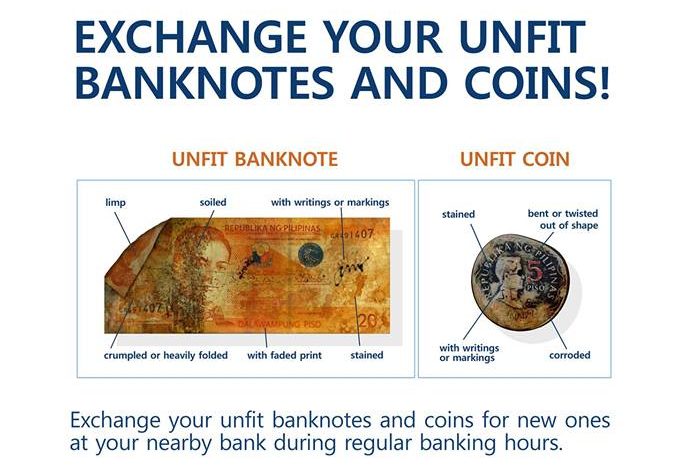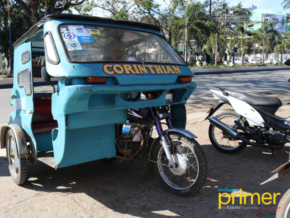Guide to Proper Handling of The Philippine Peso
If you are thinking of writing your phone number on a Philippine bill in hopes of finding true love, you might get the police calling instead. As with any country, there are laws against mishandling currency and we’ve made this guide for that.
The Philippine Peso
Philippine peso is the official currency of the Philippines with the currency code of PHP and the official symbol of ₱. Only the Central Bank (Banko Sentral ng Pilipinas or BSP) has the authority to issue the national banknotes and coins for legal tender.
Currently, the coin denomination comes in 1, 5, and 25 cents, 1, 5, and 10 pesos. The banknotes or paper bills come in denominations of 20, 50, 100, 200, 500, and 1,000 pesos.
Also read: Expat Guide: The Philippine Peso

Anti-mutilation Law
You may find that banks will not accept the deposit of mutilated bills and coins or may ask a few questions regarding how it came to be. Mutilated bills will be shredded or demonetized by the bank and offenders face penalties and jail time.
Under the Anti-mutilation Law or Presidential Decree No. 247, purposely defacing, mutilating, tearing, burning, or destroying, in any manner whatsoever, currency notes and coins issued by the Central Bank of the Philippines is punishable by law.
Offenders will face punishment by a fine of not more than Php 20,000 and/or by imprisonment of not more than 5 years. While not specified in the law, stapler marks and stickers are considered vandalism and will not be accepted for bank deposits.
Exchanging of Bills in The Bank
If the mutilation was done through accident or natural disasters such as fire, flood, and natural wear and tear, they can be exchanged in banks or at the BSP office, regional offices, or branches nationwide.

Unfit notes can still be exchanged and deposited in banks
- Tainted with ink or other chemicals;
- Limp or rag-like appearance;
- Contains heavy creases which break the fiber of the paper and indicate that disintegration has begun;
- Badly soiled; or
- With writings even if it has proper life or sizing.
Mutilated notes may be forwarded to BSP but are subject to their discretion. The owner may or may not be compensated.
- Accidental tearing;
- Through ordinary wear and tear;
- Perforated though by insects, chemicals, rodents, etc;
- Damaged due to water/chemical/other elements;
- Scorched or burned that the note becomes fragile/brittle and susceptible to disintegration/breaking; or
- Fragments of currency or torn notes joined together with transparent tape/staple wire to preserve the original design and size of the note.
The BSP put these bills under high scrutiny because the mutilation may hinder anyone to determine if the bill is fake. Refer to the official BSP Banknote Fitness Guide for further information.
Clean Note and Coin Policy
On March 13, 2019, the BSP formerly launched the Clean Note and Coin Policy (CNCP) in partnership with The Bankers Institute of the Philippines Inc., (BAIPHIL) with three objectives – to protect the integrity of the Philippine currency, to inform the public of the features of genuine notes and coins, and to develop the habit of using only clean notes and coins.
The Bankers Institute of the Philippines Inc., (BAIPHIL) is now a partner of the Bangko Sentral ng Pilipinas (BSP) for a focused, #sustainable, wide-reaching and holistic approach in the implementation of the Clean Note and Coin Policy (CNCP).Coinciding with the celebration of BSP’s 70th year of central banking in the Philippines and BAIPHIL’s 30th National Convention, the partnership was formally launched on 13 March 2019 at Hotel Veniz Burnham, #Baguio City. In her key message, BSP Managing Director Josefa Elvira E. Ditching-Lorico shared that the BSP is exploring strategic partnerships with key organizations to widen the reach of information on currency-related matters. “The BSP also enjoins the banks and the general public to ensure that the life of notes and coins is extended, by deterring unacceptable practices such as stapling and excessive folding of banknotes. Banks should also deposit or exchange on a regular basis unfit banknotes and coins with the BSP,” she added. Ms. Lorico is optimistic that the partnership will succeed in its mission to reinforce positive change in Filipinos in handing Philippine banknotes and coins.The BSP-BAIPHIL Partnership is part of a broader campaign to preserve the integrity of the Philippine currency.http://www.bsp.gov.ph/publications/media.asp?id=4992
Bangko Sentral ng Pilipinasさんの投稿 2019年4月8日月曜日
For more information on the regulations, policies, and programs of the BSP, their head office is in Malate, Manila and may be contacted through 02-708-7701.
Also read: How to Better Handle Your Money
Sources: Official Gazette, Founder’s Guide, Banko Sentral ng Pilipinas, Philippine Information Agency
Images and video grabbed from Bank Sentral ng Pilipinas













